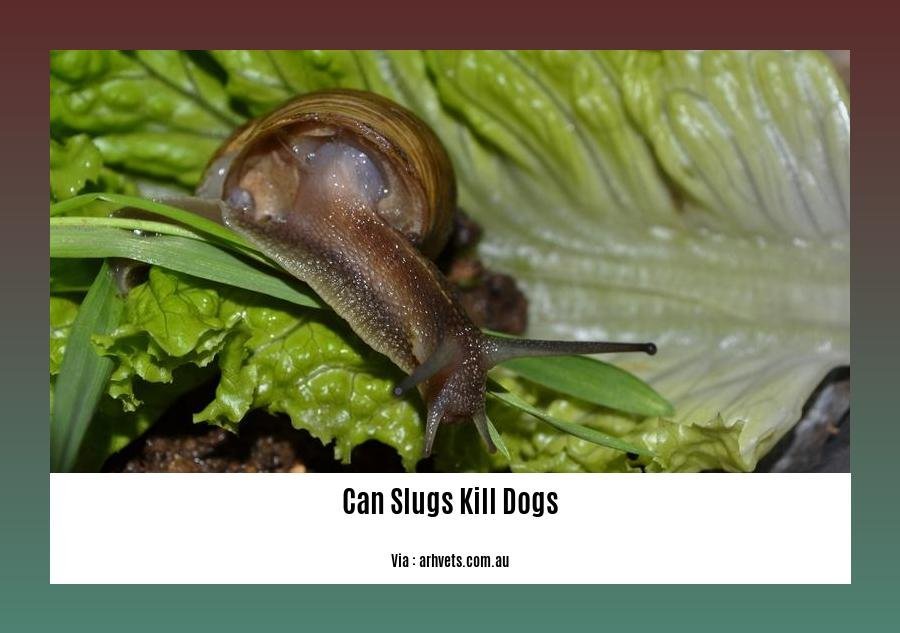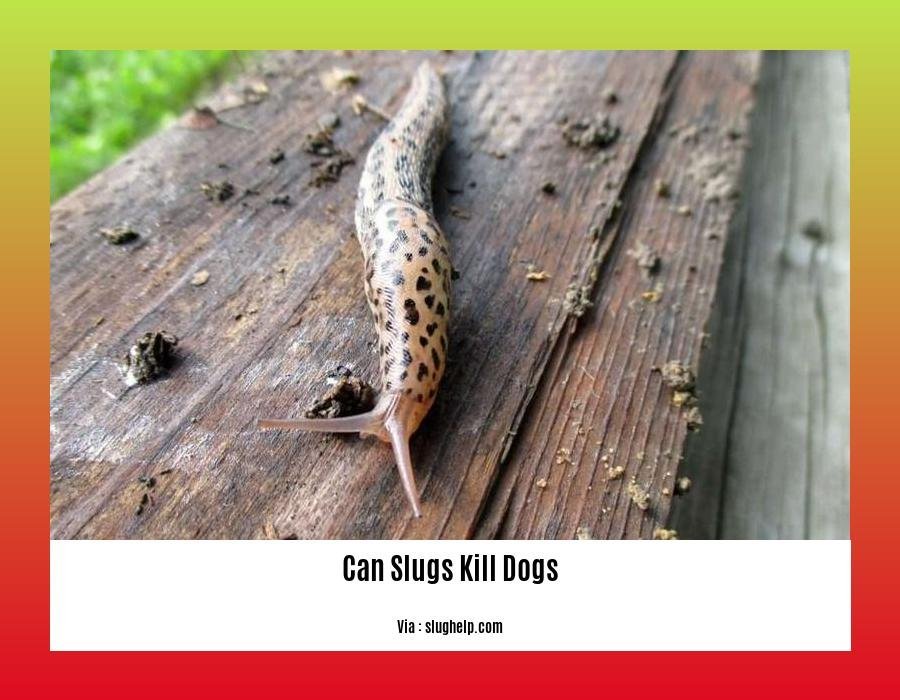Can slugs kill dogs? Understanding the potential dangers and how to protect your pet. As pet owners, we often go to great lengths to keep our furry friends safe and healthy. However, there is a lesser-known threat that may be lurking in our gardens and outdoor spaces – slugs. While they may seem harmless, these slimy creatures can pose a significant risk to our beloved dogs. In this article, we will delve into the potential dangers of slugs to dogs, exploring the various risks they present and providing essential tips on how to keep your pet protected. With a better understanding of these hazards, you can ensure the well-being of your canine companion.
Key Takeaways:
- Slugs can transmit Rat lungworms, which can be fatal to dogs if eaten or licked without medication.
- Most common garden slugs are not toxic to dogs if eaten, but they do pose a risk of lungworm infection.
- Ingesting sea slugs can be deadly for dogs.
- Preventing slug infestations can be done by keeping gardens clean and free of debris.
- Symptoms of lungworm in dogs include coughing, weight loss, and difficulty breathing.
- Lungworm can be treated with medication like Ivermectin.
- Dogs can also be infected with other parasites such as fleas, ticks, and heartworms.
- Teaching dogs to avoid slugs and snails is important as they can carry lungworm.
- If a dog ingests a slug, it is recommended to seek veterinary advice for proper treatment and care.
Can Slugs Kill Dogs? Understanding the Potential Dangers and How to Protect Your Pet

Slugs are not typically considered a direct threat to dogs, but they can pose certain dangers that pet owners should be aware of. In particular, slugs can transmit a parasite called Rat lungworm, which can be fatal to dogs if left untreated. Understanding the risks associated with slugs and implementing preventive measures can help keep your furry friend safe and healthy.
The Dangers of Rat Lungworm
One of the main concerns with slugs and dogs is the potential transmission of Rat lungworm. These small parasites can infect slugs and snails, which then become carriers of the parasite’s larvae. If a dog ingests one of these infected slugs or snails, they can become infected with Rat lungworm as well.
Identifying Symptoms and Seeking Proper Treatment
While most common garden slugs are not toxic to dogs if eaten, the ingestion of an infected slug can lead to severe health issues. Symptoms of Rat lungworm infection in dogs may manifest as coughing, weight loss, difficulty breathing, or other respiratory problems. If you suspect your dog has ingested a slug or is exhibiting any of these symptoms, it is crucial to seek veterinary advice promptly.
Prevention is Key
Preventing slug infestations in your garden is the first line of defense in protecting your dog from Rat lungworm. By keeping your garden clean and free of debris, you can reduce the slug population and minimize the risk of exposure. Additionally, teaching your dog to avoid slugs and snails can help prevent them from coming into contact with infected ones.
Treating Rat Lungworm
If your dog becomes infected with Rat lungworm, timely treatment is essential. Veterinary professionals may prescribe medications such as Ivermectin to eliminate the parasite and alleviate the symptoms. Prompt diagnosis and treatment increase the chances of a successful recovery.
Other Parasites to Consider
While slugs and Rat lungworm pose a specific risk, it’s essential to remember that dogs can also be susceptible to other parasites like fleas, ticks, and heartworms. Maintaining a regular preventive care routine, including parasite control medication, can help safeguard your dog against various parasites.
Conclusion
In conclusion, while slugs may not directly kill dogs, the potential dangers they present should not be taken lightly. Understanding the risks associated with slugs and implementing preventive measures can help protect your beloved companion from the transmission of Rat lungworm and other parasites. By maintaining a clean garden environment, teaching your dog to avoid slugs and snails, and seeking veterinary advice if needed, you can ensure your pet’s safety and well-being. Remember, a little vigilance goes a long way in keeping your dog healthy and happy.
Can slugs harm dogs? Find out how these slimy creatures can pose a danger to your furry friend. Learn more about can slugs harm dogs.
Discover if slugs can hurt dogs and what precautions you can take to keep your pet safe. Read more about can slugs hurt dogs here.
Curious about the compatibility of turtles and tortoises? Learn whether these two species can live together and coexist in harmony. Find out more about can turtles and tortoises live together.
Interested in the breeding habits of turtles and tortoises? Dive into the fascinating world of reproduction and discover can turtles and tortoises mate with each other.
Preventive Measures to Protect Dogs from Slugs

Slugs may seem harmless, but they can pose significant risks to our furry companions. As responsible pet owners, it is crucial to understand the potential dangers associated with slugs and take preventive measures to protect our beloved dogs.
Understanding the Risks:
-
Slugs can carry a parasite called rat lungworm, which can be harmful to dogs. Ingesting slugs or their slime can lead to rat lungworm infection, causing symptoms such as coughing, weight loss, difficulty breathing, and respiratory problems[^1^].
-
To protect our dogs from slug-related diseases, we need to implement preventive measures. Here are some essential steps you can take:
Vaccinations and Parasite Control:
-
Making sure your dog is up-to-date on vaccinations is vital to their overall health. Consult with your veterinarian to ensure your dog receives vaccines that offer protection against diseases caused by parasites, including those transmitted by slugs[^2^].
-
Regularly administer parasite control treatments recommended by your veterinarian. These treatments can help minimize the risk of slug-related diseases by preventing infestations and killing any parasites that may be present[^2^].
Grooming and Hygiene Practices:
-
Regular grooming and hygiene practices can aid in early identification and prevention of slug infestations in dogs. Bathing your dog regularly helps ensure their fur is clean, reducing the chances of slugs or their slime attaching to their coat[^3^].
-
Brushing your dog’s coat not only keeps it healthy and shiny but also allows you to examine their fur for any signs of slugs or other parasites. Early detection is key to preventing further complications[^3^].
Eliminating Slugs from Dogs:
-
If you discover slugs on your dog, it is essential to remove them promptly and safely. Using organic slug killers, such as Sluggo Max, can help eliminate the slugs while minimizing the risk of harm to your dog[^4^].
-
Avoid using slug baits containing metaldehyde, as they can be neurotoxic if ingested by your dog. In case of accidental ingestion, seek immediate veterinary care to ensure proper treatment[^5^].
-
It is important to note that if your dog has been receiving preventive measures prescribed by a veterinarian, consuming a slug may not cause harm, as not all slugs carry lungworm larvae[^6^].
Preventing Slug Ingestion:
-
Teaching your dog to avoid slugs and snails can significantly reduce the risk of slug-related diseases. Training them to refrain from interacting with these creatures can be a lifesaving preventive measure[^7^].
-
Keeping your garden slug-free is also crucial. Regularly remove any slug habitats, such as moist areas or hiding spots, to minimize the chances of slugs coming into contact with your dog[^2^].
Key Takeaways:
- Slugs can carry a parasite called rat lungworm, which can be harmful to dogs and cause symptoms such as coughing, weight loss, and difficulty breathing[^1^].
- Vaccinations and parasite control are essential in protecting dogs from slug-related diseases[^2^].
- Regular grooming and hygiene practices, like bathing and brushing, aid in early identification and prevention of slug infestations[^3^].
- Organic slug killers, such as Sluggo Max, can be used to eliminate slugs from dogs safely[^4^].
- Avoid using slug baits containing metaldehyde, as they can be neurotoxic to dogs. Seek immediate veterinary care if ingestion occurs[^5^].
- Teaching your dog to avoid slugs and keeping your garden slug-free are important preventive measures[^7^].
Sources:
PetDT – Are Slugs Poisonous to Dogs? Should You Be Worried?
Smart Dog Owners – Dog Safe Slug Killers – Get Rid Of Slugs
Treatment Options for Slug-Borne Illnesses in Dogs
Key Takeaways:
- The specific treatment options for dogs affected by slug exposure depend on the health issue or symptoms they are experiencing.
- Lungworm infection in dogs may require deworming medication.
- Bacterial infections resulting from slug exposure may necessitate antibiotics.
- Severe cases may require supportive care, such as fluid therapy.
- It is important to be aware of the potential dangers slugs can pose to dogs and take preventive measures to protect your pet.
Slugs and snails can carry the lungworm parasite, which can lead to serious health issues if passed on to dogs. Even ingesting the slime produced by slugs can expose dogs to lungworm larvae. Therefore, it is crucial to understand the treatment options available for slug-borne illnesses in dogs.
When it comes to lungworm infections, deworming medication prescribed by a veterinarian is the recommended treatment option. This medication helps eliminate the lungworms from the dog’s system and can be administered orally or through injections, depending on the severity of the infection.
In cases where dogs develop bacterial infections as a result of slug exposure, antibiotics may be necessary. These medications help fight off the bacteria and prevent the infection from spreading further. It is important to consult with a veterinarian to determine the appropriate antibiotic and dosage for your dog.
For severe cases, supportive care may be required to help the dog recover. This can include fluid therapy to ensure proper hydration and nutrition, as well as other treatments based on the specific symptoms and needs of the dog.
While some chemical-based slug treatments may be effective, it is important to consider their impact on wildlife and the environment. Fortunately, there are dog-friendly slug treatment options available, such as organic slug killers that are safe for both dogs and the surrounding ecosystem.
In conclusion, the treatment options for slug-borne illnesses in dogs depend on the specific health issue or symptoms they are experiencing. Deworming medication, antibiotics, and supportive care may be necessary in different cases. It is crucial to consult with a veterinarian for proper diagnosis and treatment recommendations. By being aware of the potential dangers slugs can pose to dogs and taking preventive measures, you can help protect your beloved pet from slug-related risks.
Sources:
- Is it possible for a dog to become ill by licking a slug? (Buzzsharer)
- Dogs Eating Slugs & Lungworm | My Pet and I – @Elanco (@Elanco)
Importance of Regular Check-ups and Consultations with a Veterinarian
When it comes to the health and well-being of our beloved pets, regular check-ups and consultations with a veterinarian play a critical role. Just like humans, animals can develop hidden problems and illnesses that may go unnoticed without a thorough examination. That’s why it’s important to prioritize these check-ups to ensure early detection and treatment.
Why Regular Check-ups are Crucial for Pets
Regular veterinary check-ups are vital for maintaining the overall health of our furry friends. Animals, such as cats and dogs, are experts in hiding pain and discomfort, making it challenging for pet owners to identify potential issues. However, experienced veterinarians possess the expertise and skills to uncover these hidden problems during check-ups.
Alongside this, regular check-ups allow veterinarians to conduct necessary examinations and tests to ensure the well-being of our pets. These comprehensive evaluations help in identifying any potential health concerns before they escalate, enabling early intervention and treatment that can prevent further complications.
Prevention is Better than Cure
Wellness check-ups and testing not only help in the early detection of diseases but also provide an opportunity for veterinarians to suggest preventive measures. These preventative measures, such as vaccinations and parasite control, are essential in minimizing the risks of various health issues, including those related to slugs and other parasites.
Furthermore, regular check-ups aid in other preventive measures, such as deworming and tick control. These measures protect our pets from the dangers associated with parasites that can affect their health and well-being.
Savings in More Ways than One
Did you know that regular check-ups can save pet owners money in the long run? Early detection and treatment during wellness visits can prevent the need for costly procedures or surgeries. By addressing health concerns at an early stage, before they worsen, veterinary care can be more effective and less expensive.
Additionally, regular check-ups provide an opportunity for pet owners to have question-and-answer sessions with veterinarians. This allows owners to address any concerns, learn more about their pet’s health, and receive guidance on proper care. Through these discussions, pet owners gain valuable knowledge that can aid in maintaining their pet’s overall well-being.
Preparing for the Future
Another advantage of regular check-ups is that they help acclimate our pets to the veterinary environment. By visiting the vet regularly when our pets are healthy, we can create positive associations and lessen any stress or anxiety our pets may feel during future visits.
Ultimately, annual check-ups, also known as wellness visits, play a vital role in ensuring our pets lead healthy and happy lives. They help prevent pain, save money, and allow pet owners to gain more knowledge about their pet’s health. So, let’s prioritize regular check-ups and consultations with a veterinarian to keep our furry companions safe and thriving.
Key Takeaways:
- Regular check-ups and consultations with a veterinarian are crucial for maintaining the overall health and well-being of our pets.
- These check-ups allow for early detection and treatment of hidden problems and potential health concerns.
- Preventive measures, such as vaccinations and parasite control, can be recommended during check-ups to minimize the risks of various health issues.
- Regular check-ups save money by preventing costly procedures or surgeries through early intervention and treatment.
- Check-ups provide an opportunity for owners to address concerns, learn more about their pet’s health, and receive guidance on proper care.
- Acclimating pets to the vet environment through regular check-ups can reduce stress during future visits.
Sources:
– Zoetis Petcare: Regular Veterinary Check-Ups
– Happiest Health: Why regular vet check-ups are essential for your pets
FAQ
Q1: Can slugs be fatal to dogs?
A1: Slugs can be fatal to dogs in certain cases. While most common garden slugs are not toxic if eaten, they can increase the risk of lungworm, which can be fatal without medication. Sea slugs, on the other hand, can be deadly if ingested by dogs.
Q2: What are the symptoms of lungworm in dogs?
A2: Lungworm infection in dogs can lead to various symptoms, including coughing, weight loss, and difficulty breathing. If you suspect your dog may be infected with lungworm, it is important to seek veterinary advice for proper diagnosis and treatment.
Q3: Can dogs become infected with lungworm by eating slugs?
A3: Yes, dogs can become infected with lungworm by eating slugs that contain the parasite’s larvae. Slugs and snails can carry the lungworm parasite, which can lead to serious health issues if passed on to dogs.
Q4: How can I protect my dog from slug-related risks?
A4: To protect your dog from slug-related risks, it is essential to teach them to avoid slugs and snails. Preventative measures such as keeping gardens clean and free of debris can help minimize slug infestations. Additionally, regular veterinary check-ups and deworming medication can help prevent and treat lungworm infection in dogs.
Q5: What should I do if my dog ingests a slug?
A5: If your dog ingests a slug, it is recommended to seek veterinary advice to ensure proper treatment and care. The specific treatment options will depend on the health issue or symptoms your dog is experiencing. In some cases, deworming medication may be prescribed for lungworm infection or antibiotics for bacterial infections resulting from slug exposure.
- Unveiling the Enigma: Mansoureh Khojasteh Bagherzadeh’s Public Appearances & Private Life in Iran - July 18, 2025
- Unveiling the Mystery: Mansoureh Khojasteh Bagherzadeh’s Husband: A Rare Glimpse into a Private Life - July 18, 2025
- Unveiling Masoud Khamenei’s Mother: Power, Influence, and Iran’s Future - July 18, 2025
















